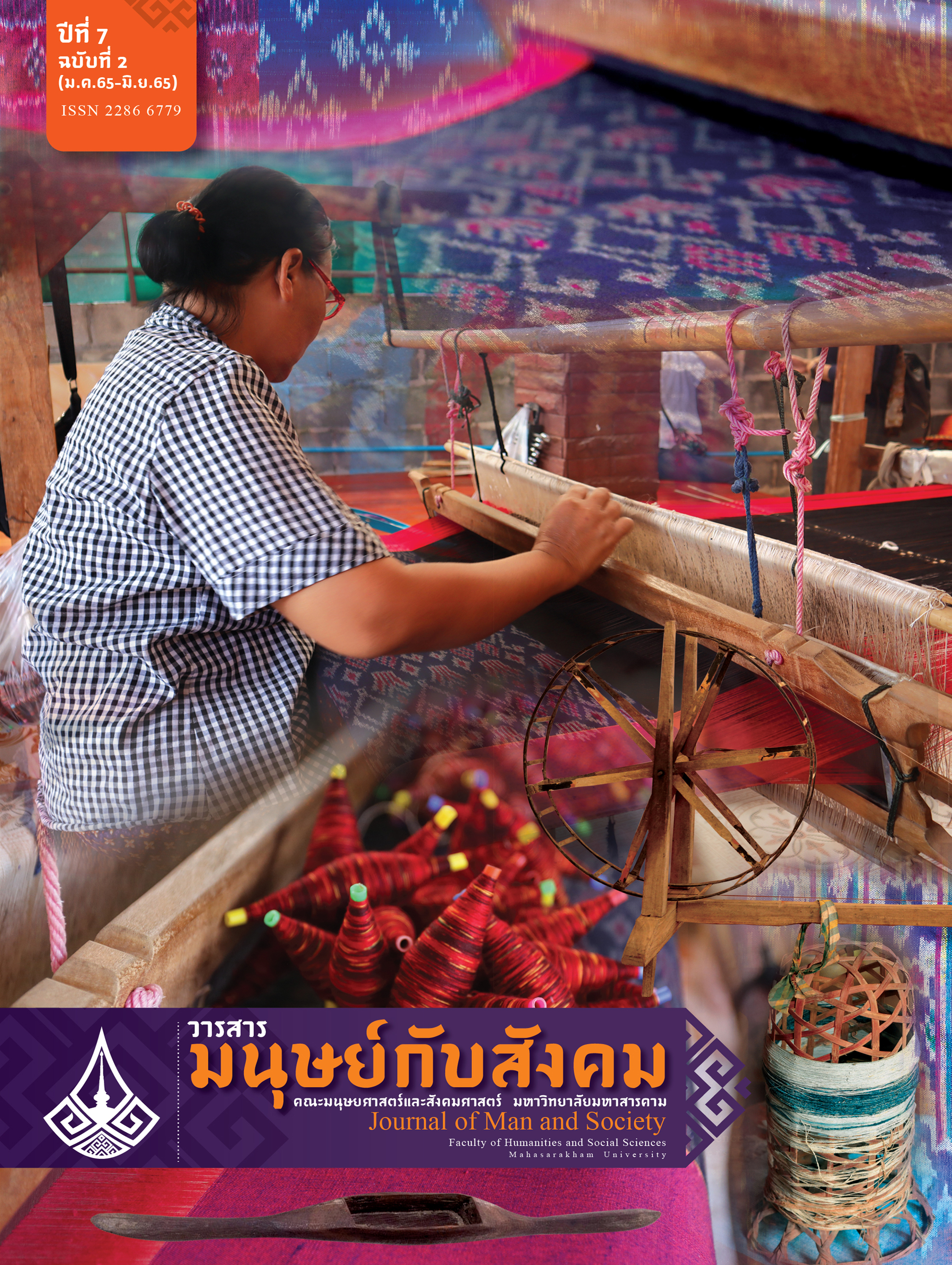การเมืองวัฒนธรรมในนวนิยายสัจนิยมมหัศจรรย์ของตรี อภิรุม คณะมนุษยศาสตร์และสังคมศาสตร์ มหาวิทยาลัยมหาสารคาม
Main Article Content
บทคัดย่อ
บทความนี้มีวัตถุประสงค์เพื่อศึกษาการเมืองวัฒนธรรมในนวนิยายแนวสัจนิยมมหัศจรรย์ของ ตรี อภิรุม จำนวน 11 เรื่อง ในเชิงความหมายของพื้นที่อำนาจ ด้วยแนวคิดการเมืองวัฒนธรรม (cultural politics) โดยศึกษา 4 ประเด็น ได้แก่ การเมืองของพื้นที่การเมืองของชนชั้น การเมืองของความเชื่อทางศาสนาและอุดมการณ์ และการเมืองของ
เพศสถานะ ผลการศึกษาพบว่า นวนิยายสัจนิยมมหัศจรรย์ของ ตรี อภิรุม มีบทบาทในการเปิดพื้นที่การเมืองวัฒนธรรม ดังนี้ 1) การเมืองของพื้นที่ พบว่า ฉากและสถานที่เป็นพื้นที่เชิงซ้อนโดยเป็นสถานที่อยู่อาศัย เป็นเมืองโบราณเป็นสัญลักษณ์สื่อสถานภาพทางสังคมและความคิดของตัวละครด้านศีลธรรมจริยธรรม เป็นบรรทัดฐานของชีวิตปัจเจกชนและชีวิตของสังคม 2) การเมืองของชนชั้น พบว่าสื่อถึงความเหลื่อมล้ำไม่เท่าเทียมของปวงชนในสังคมไทยทั้งชุมชนเมืองและชนบท ชนชั้นที่ได้เปรียบเป็นผู้มีฐานะดีมียศถาบรรดาศักดิ์ ส่วนชนชั้นที่เสียเปรียบเป็นชนชั้นกลางและเป็นสามัญชนคนชายขอบที่อาศัยอยู่ในบ้านป่ากลางดง 3) การเมืองของความเชื่อทางศาสนาและอุดมการณ์ พบว่านวนิยายที่เขียนในยุคหลังอาณานิคมมีบรรยากาศของสงครามโลกครั้งที่หนึ่ง ครั้งที่สอง สงครามอินโดจีนและสงครามเย็น ซึ่งมีผลกระทบต่อเศรษฐกิจครัวเรือนและเศรษฐกิจชาติที่ตกต่ำฝืดเคืองเกิดอาชญากรรมลักขโมยปล้นฆ่า ประชาชนปกป้องตนด้วยธรรมานุภาพ เครื่องรางของขลัง เวทมนต์คาถาและไสยศาสตร์ 4) การเมืองของเพศสถานะ พบว่าผู้เขียนให้ความสำคัญต่อความเท่าเทียมทางเพศ เพศชายมีคุณสมบัติสำคัญคือมีความกล้าหาญเป็นผู้นำ เป็นคนดีมีศีลธรรม ส่วนเพศหญิงมีคุณสมบัติด้านความดีงามทั้งใจและกาย ยอมรับกฎแห่งกรรมมั่นคงในศีล ทาน ภาวนา และมีสำนึกเชิงจริยธรรมต่อธรรมชาติ
Article Details

อนุญาตภายใต้เงื่อนไข Creative Commons Attribution-NonCommercial-NoDerivatives 4.0 International License.
เนื้อหาและข้อมูลที่ตีพิมพ์ลงในวารสารมนุษย์กับสังคม ถือเป็นข้อคิดเห็นและความรับผิดชอบโดยตรงของผู้เขียนซึ่งกองบรรณาธิการวารสารไม่จำเป็นต้องเห็นด้วยหรือร่วมรับผิดชอบใดๆ
บทความ ข้อมูล เนื้อหา รูปภาพ ฯลฯ ที่ได้รับการตีพิมพ์ในวารสารมนุษย์กับสังคม ถือเป็นลิขสิทธิ์ของวารสาร หากบุคคลหรือหน่วยงานใดต้องการนำทั้งหมดหรือส่วนหนึ่งส่วนใดไปเผยแพร่ต่อหรือเพื่่อกระทำการใดๆ จะต้องได้รับอนุญาตเป็นลายลักษณ์อักษรจากวารสารมนุษย์กับสังคมก่อน
เอกสารอ้างอิง
ชูศักดิ์ ภัทรกุลวณิชย์. (2559). สัจนิยมมหัศจรรย์ ในงานของกาเบรียล การ์เซีย
มาร์เกซ,โทนี มอร์ ริสัน และวรรณกรรมไทย. กรุงเทพฯ: อ่าน.
ตรี อภิรุม. (2525). แก้วขนเหล็ก. พิมพ์ครั้งที่ 2. กรุงเทพฯ: โชคชัยเทเวศร์.
ตรี อภิรุม. (2543). ทายาทอสูร. พิมพ์ครั้งที่ 2. กรุงเทพฯ: ดับเบิ้ลนายน์.
ตรี อภิรุม. (2550). จินตวาณี. พิมพ์ครั้งที่ 3. นนทบุรี: อุทยานความรู้.
ตรี อภิรุม. (2550). ลูกสาวซาตาน. พิมพ์ครั้งที่ 3. นนทบุรี: อุทยานความรู้.
ตรี อภิรุม. (2551). นางพญาอสรพิษ. พิมพ์ครั้งที่ 2. นนทบุรี: อุทยานความรู้.
ตรี อภิรุม. (2551). บาดาลดิน. นนทบุรี: อุทยานความรู้.
ตรี อภิรุม. (2551). ภูตพยัคฆ์. พิมพ์ครั้งที่ 2. นนทบุรี: อุทยานความรู้.
ตรี อภิรุม. (2551). มฤตยูผยอง. พิมพ์ครั้งที่ 2. นนทบุรี: อุทยานความรู้.
ตรี อภิรุม. (2551). มิติที่สาม. พิมพ์ครั้งที่ 2. นนทบุรี: อุทยานความรู้.
ตรี อภิรุม. (2559). นาคี. พิมพ์ครั้งที่ 5. กรุงเทพฯ: โพสต์บุ๊กส์.
ตรี อภิรุม. (2560). นาคีภาค 2. กรุงเทพฯ: โพสต์บุ๊กส์.
ธเนศ วงศ์ยานนาวา. (2556) เขียนหญิง: อำนาจ โยนี และการเขียนของลึงค์.
กรุงเทพฯ: Unfinished project.
ประจักษ์ ก้องกีรติ. (2558). การเมืองวัฒนธรรมไทย: ว่าด้วยความทรงจำ/วาทกรรม/
อำนาจ กรุงเทพฯ: ฟ้าเดียวกัน.
วิไลเลขา ถาวรธนสาร. (2545). ชนชั้นนำไทยกับการรับวัฒนธรรมตะวันตก.
กรุงเทพฯ: เมืองโบราณ.
สุรเดช โชติอุดมพันธ์. (2554). สัจนิยมมหัศจรรย์ในวรรณกรรมของกาเบรียล
การ์เซีย มาร์เกซ. กรุงเทพฯ: จุฬาลงกรณ์มหาวิทยาลัย.
สุรเดช โชติอุดมพันธ์. (2559). อ่านเมือง เรื่องคนกรุง: วรรณกรรม วิถีความสัมพันธ์
และภาพแทนของพื้นที่ กรุงเทพฯ: โครงการเผยแพร่ผลงานวิชาการ
คณะอักษรศาสตร์ จุฬาลงกรณ์มหาวิทยาลัย.
อมรา พงศาพิชญ์. (2543). ความหลากหลายทางวัฒนธรรม (กระบวนทัศน์และบทบาท
ในประชาสังคม). พิมพ์ครั้งที่ 2. กรุงเทพฯ: สำนักพิมพ์แห่งจุฬาลงกรณ์
มหาวิทยาลัย.


